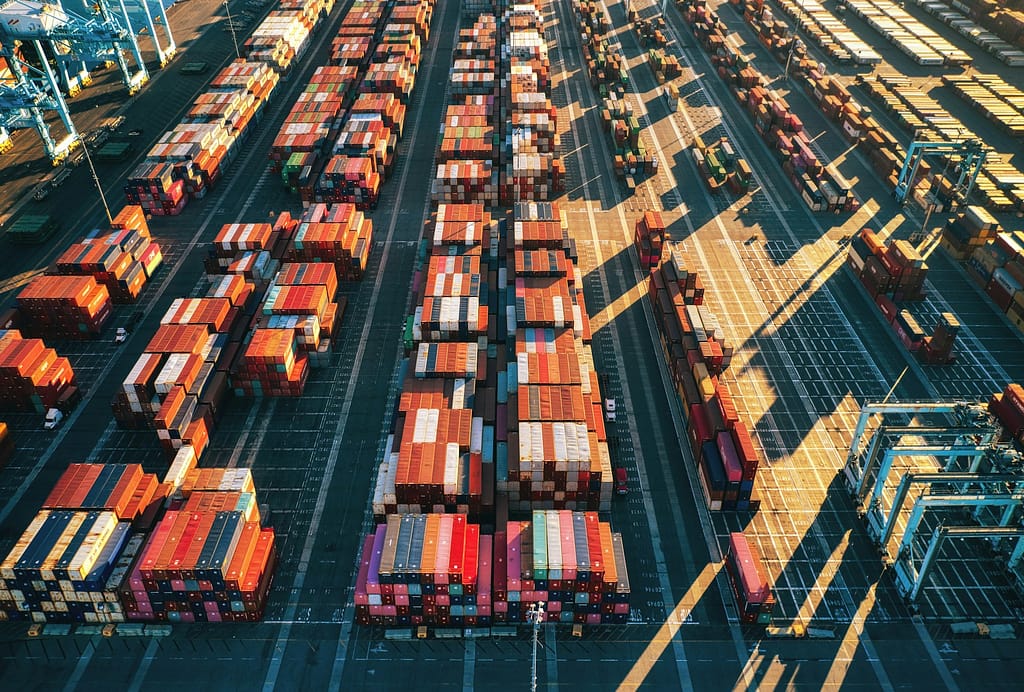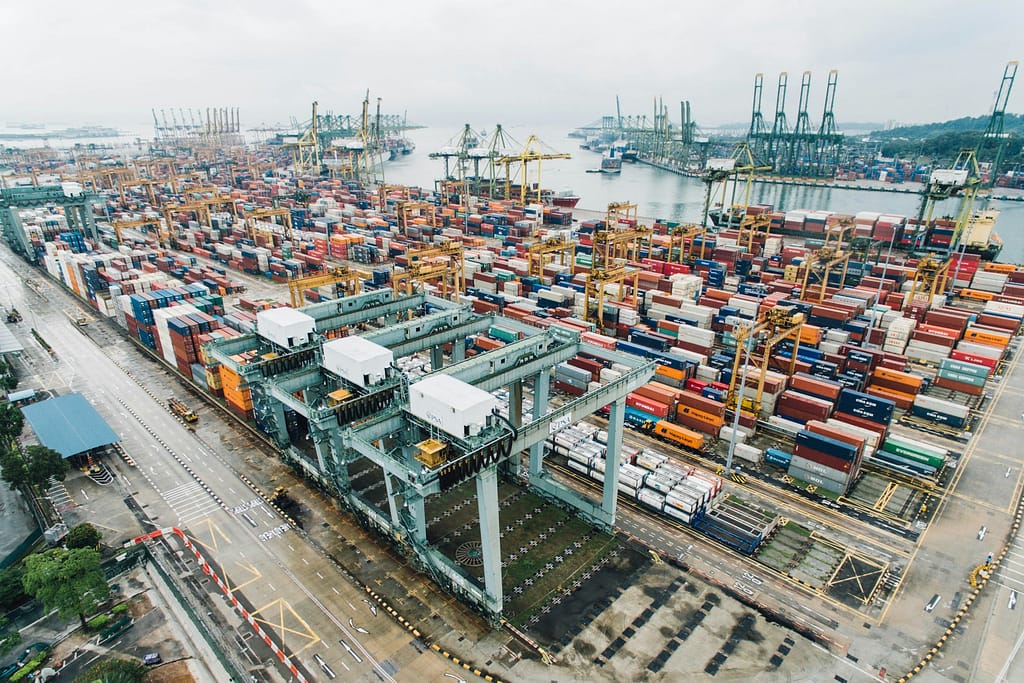Think about everything you buy – your phone, clothes, coffee beans. Chances are, they traveled across oceans on giant ships before ending up in your hands. That’s where port logistics comes in: the behind-the-scenes magic keeping those ships moving and goods flowing.
However, managing a busy port is like conducting a massive orchestra with lots of moving parts that must work together perfectly.
And when things go wrong (like in the infamous 2021 Suez Canal blockade, which wasn’t a logistical mistake), it can cause a real headache for everyone involved. Delays mean products arrive late, businesses lose money, supply chains are disrupted, and customers get seriously frustrated.
That’s why efficient port logistics is so important – it’s the key to keeping the global supply chain humming along smoothly.
In this article, we’ll take a closer look at the world of port logistics, explore the challenges it faces, and see how clever technology like IoT can help keep those ships sailing and those goods arriving right on schedule.
Don’t miss out: CTD oceanographic equipment – the best tracking solutions
Understanding port logistics, the backbone of global trade

Port logistics is a vital part of the global economy. It’s the complex system that keeps goods flowing from one country to another, connecting businesses and consumers around the world.
Without efficient port logistics, our shelves would be empty, our factories would grind to a halt, and our global economy would suffer.
What exactly does port logistics involve? Well, it’s more than just ships and containers.
It’s a carefully coordinated set of activities that includes everything from unloading cargo to storing it safely, ensuring it clears customs regulations, and finally, getting it onto trucks or trains for its final destination.
This process requires careful planning, coordination, and communication between multiple stakeholders. Shipping companies bring in the goods, port authorities control inbound and outgoing traffic, customs officials make sure everything is legal and safe, and transportation providers (like trucking companies and railroads) get those goods elsewhere.
Each of these groups must communicate and cooperate effectively to keep everything running smoothly. When they do, everyone benefits: businesses can get their products to market quickly and efficiently, consumers have access to a wider variety of goods, and the overall economy gets a boost.
That’s why having a strong and efficient port logistics system is so critical – it’s the foundation of a healthy and thriving global marketplace.
Bottlenecks and disruptions in port logistics

While ports play a vital role in global trade, they also face various challenges that can disrupt operations and impact efficiency. These challenges range from congestion and delays to security risks and environmental concerns. Let’s take a closer look at some of the key issues:
- Congestions and delays: one of the biggest headaches for ports is congestion. When too many ships arrive at once, it can create bottlenecks and delays, leading to increased costs and frustration for everyone involved. This can be caused by a variety of factors, including unexpected weather events, port infrastructure limitations, and inefficient cargo handling processes.
- Lack of visibility: another challenge is the lack of real-time visibility into cargo location and status. Knowing where a particular container is at any given moment can be a logistical nightmare. This lack of transparency can lead to delays, miscommunication, and difficulty in responding quickly to unexpected events.
- Security risks: some ports are also vulnerable to security risks, including theft, damage, and unauthorized access to cargo. Protecting valuable goods and ensuring the safety of personnel is a top priority for port authorities. Implementing robust security measures and monitoring systems is crucial to mitigate these risks.
- Environmental concerns: finally, ports must also address environmental concerns. The constant movement of ships and trucks can contribute to air and noise pollution, impacting surrounding communities and ecosystems. Finding ways to reduce emissions and minimize the environmental footprint of port operations is essential for sustainable growth.
These challenges highlight the need for innovative solutions to improve efficiency, enhance security, and promote sustainability in port logistics.
IoT solutions: transforming port logistics for the better

Remember those challenges we talked about in the last section? Well, that’s where the Internet of Things (IoT) enters the fray.
In simple terms, you may think of IoT as a network of smart devices that can talk to each other and share information. These devices can be attached to containers, cranes, trucks, and even the port infrastructure itself, providing a constant stream of data that helps ports overcome those pesky challenges and operate more efficiently.
Let’s look at how we at Datanet IoT can make a real difference in this context:
Asset tracking: keeping an eye on your cargo
With Datanet IoT’s asset trackers, you can say goodbye to the guessing game of “Where’s my container?”
These clever devices attach to your cargo and provide real-time location updates, so you always know where your goods are, whether on a ship, in the yard, or on their way to their final destination. This improved visibility helps streamline operations, reduces delays, and makes it much easier to manage your inventory.

Plus, many of our trackers come with anti-theft features that trigger an alarm if a container or key equipment moves too far from its designated location, adding an extra layer of security to your valuable assets.
Environmental monitoring: keeping things green
We understand that ports are busy places, and all that activity can impact the environment. But with Datanet IoT’s environmental monitoring solutions, you can keep a close eye on things like air quality and temperature, and even track how much carbon your operations are shooting into the atmosphere.
In a world that’s trying to be greener by the day, this data helps you stay compliant with environmental regulations and identify areas where you can make improvements to reduce your footprint and become a more sustainable operation.
Predictive maintenance: preventing problems before they happen
Imagine if you could know when a piece of equipment was about to fail before it actually broke down. Such is the power of predictive maintenance.
Datanet IoT’s sensors can monitor the health of your equipment, like cranes and trucks, and alert you to potential problems before they cause costly downtime. This allows you to schedule maintenance proactively, keeping your operations running smoothly and avoiding those unexpected disruptions that can throw a wrench in your plans.
Closing thoughts

While these IoT solutions offer tremendous potential for improving port logistics, let’s not forget that technology is just one piece of the puzzle. Implementing efficient solutions for port logistics requires careful planning, collaboration, and ongoing adaptation.
Global trade is a complex beast, and staying ahead of the game requires thinking outside the box and embracing new ideas. With the help of IoT and its sister technologies (like artificial intelligence, machine learning, and 5G connectivity), ports and shipping companies can become more efficient, secure, and sustainable, giving them a real edge in the global market.
At Datanet IoT, we’re all about helping businesses like yours navigate the challenges of today’s world. We know that every operation is different, and that’s why we offer a range of IoT-based solutions for asset and environmental tracking that can be tailored to your specific needs.
Whether you want to keep a closer eye on your valuable assets or reduce your environmental impact, we’ve got you covered. We believe collaboration is key, and we’re committed to working closely with you to understand your unique challenges and find the right solutions to help you thrive.
If you’re ready to explore how these tiny devices can transform your business, get in touch with us today. Let’s work together to unlock your potential and set sail towards a brighter future!






